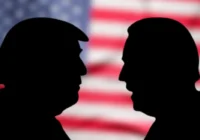“I am not here to tell you how to think,” Oprah Winfrey told a 10,000-strong crowd at the Iowa Events Center in downtown Des Moines. “I am here to tell you to think.” It was December 2007, eight months before Barack Obama was selected as the Democratic presidential candidate and 11 months before he won the US presidency.
It was the most potent celebrity endorsement of a political candidate in history. Distancing herself from partisan politics, Oprah insisted she was acting out of a sense of obligation: “I feel compelled to stand up and speak out for the man who I believe has a new vision for America.”
She closed with gravity, drawing on Ernest J. Gainer’s 1971 novel The Autobiography of Miss Jane Pittman, which tells the life story of a woman born in slavery at the end of the American civil war. The book recounts how each time a new baby was born, its mother would take it to Jane Pittman, who would hold the baby John-the-Baptist-like and wonder aloud whether the child would be the deliverer of black people: “Is you the one? Oprah refined the grammar, changed the context and answered affirmatively that Obama was indeed The One.
Rarely, if ever, has a single affirmation been so pivotal: It was less an endorsement, more a proclamation. But is a thumbs-up from rapper-turned-country music star Kid Rock going to make much difference to Donald Trump’s chances at this year’s presidential election? For that matter, is anyone’s endorsement going to make an impact? I can think of one, but more on that later.
More than entertainers
Politicians have attracted endorsements from popular entertainers since the 1950s. Republican President Dwight Eisenhower, in 1952 and 1956, recruited the likes of Bing Crosby and Ethel Merman at a time when the popular assumption was that Hollywood stars were communist sympathizers.
Frank Sinatra re-recorded “High Hopes” complete with the line “Vote for Kennedy” as part of JFK’s successful presidential campaign in 1960. Around the same time, Britain’s Labour Party leader Harold Wilson received conspicuous support from the Beatles. Twenty years later, Sinatra donated $4 million to Republican Ronald Reagan’s successful presidential campaign.
Jane Fonda threw her weight behind Democrat George McGovern in the 1972 presidential
campaign. Fonda’s endorsement aligned with her opposition to the Vietnam War.
Celebrities, including athletes, have been conspicuous in every postwar US presidential campaign, though basketball star and shoe endorser Michael Jordan famously remained absent from a Senate race in 1990 explaining — when invited to endorse Harvey Gantt, an African-American Democratic candidate in North Carolina — “Republicans buy sneakers too.”
Bill Clinton garnered support from celebrities, including Barbara Streisand and Whoopi Goldberg, during his presidential campaigns in 1992 and 1996. The value of Michael Jackson’s endorsement was arguable. While Jackson was an immensely popular and influential figure with a vast global fanbase, Jackson faced allegations of child sexual abuse. (He was eventually cleared.)
Since Clinton, celebrity endorsements for presidential candidates are a required part of campaigns. The 1990s witnessed an expansion of the roles of showbusiness entertainers: Perhaps they felt the need to demonstrate they were more than entertainers and held solid beliefs, values and commitments. Politicians enthusiastically gave them a platform and what evidence there is suggests they benefited.
Risky business
In 2016, Trump counted Mike Tyson and Kanye West among his celebrity endorsers. While Tyson was a convicted rapist, having African Americans among his cohort presumably lent Trump credibility among blacks. Black voters make up about 11–12 percent of the US electorate and Trump lobbied for their votes, though he managed only 8% of black votes in both 2016 and 2020.
While West, or Ye, as he prefers, had previously favored Democrat candidates, his approval couldn’t have done Trump any harm. Today, Ye is kryptonite (the fictional green mineral that weakens Superman). His flip-flopping was one thing, but his antisemitic remarks in 2022 persuaded sportswear manufacturer Adidas that it should cancel his best-selling “Yeezy” line, valued at $250 million per year.
Adidas’s experience with Ye may have chastened political candidates. Popular, black and seemingly multitalented — he designed his own clothes range — Ye imploded with an unexpected stream of invectives. He did have a history — having described slavery as a “choice” in 2018 — so Adidas must have known he was a risk. As are many other celebrities, of course. Many rose to prominence after scandals and know how to ride them like surfers conquering waves, transforming controversy into a vehicle for even greater fame.
Consumer culture
Endorsements have been integral to consumer culture, which began properly in the economic prosperity following the end of World War II in 1945. Hollywood stars appeared in advertising campaigns, and their effect on sales was encouraging enough to persuade ad agencies to pay for their services.
Today, they pay mightily: in 2015, LeBron James signed a multi-year deal with Nike valued at $1 billion. James used his platform, including social media and public appearances, to express his support for Joe Biden and his running mate, Kamala Harris, in 2020. Political candidates don’t pay endorsers, of course.
The value of celebrities to advertisers is reflected in sales: Some individuals, including Oprah, Jordan, George Clooney and Jennifer Aniston, can pitch for almost anything and make it sell. On the other hand, Rihanna didn’t work for Nivea, which dropped her in 2012. Often, the relationship is symbiotic, with celebrities enhancing their reputations by associating themselves with popular brands.
However, selling things, inanimate material objects, is one thing; selling living sentient beings is another. Politics, like every other aspect of society, has been penetrated by celebrity: Votes are cast as much for people as what those people stand for. Ideals, values, policies and commitments will always feature in the mix when voters decide. As will relatability: Politicians strive to make voters think they share their concerns, identify with their problems and understand their feelings. When they can’t do it, they hope their endorsers can.
Convictions or self-aggrandizement?
Oprah was so influential she shooed off disbelief. Her blessing was strong enough to convince, even empower voters. But she was extraordinary. Other celebs elicit a note of cynical perspicacity. Voters suspect them more than respect them.
I have only inference and extrapolation to back up my claim. A recent research project, in which I was involved, centered on sports fans’ reactions to athletes, clubs, sponsors or entire sports leagues that push boundaries and make pronouncements on causes, such as war, racism and LGBTQ+ issues. A swath of fans detected their sermonizing was largely self-aggrandizement, as if saying, “We want you to take us seriously and accept that we truly believe in this cause [whatever it is].” If their gestures and pronouncements do little else, they prove athletes know how to read the room: They are aware of voguish attitudes and values and adapt themselves to suit them.
It may be fallacious to use the same logic for voters. Or it may be instructive. If the latter, celebrities see elections as pretexts for posturing and, ever-eager to provide an illusion of depth to further their ambitions, they offer their support. In this sense, presidential elections offer painless opportunities to burnish any celebs’ profundity. At least, if we follow the logic. Joe Biden’s alarming performance in front of 51 million American viewers recently may give prospective endorsers cause for thought. How much burnish is there in associating with a faltering politician?
What about Taylor?
The endorsements ringing for Biden sound like cracked bells: Barbra Streisand, Julia Roberts, George Clooney (since retracted, however) and others, including Robert De Niro, have all made their allegiances known before. Apart from the aforementioned Kid Rock, Donald Trump has only a handful of celebs, most of pensionable age, in his corner.
The unique figure in modern cultural history is, of course, Taylor Swift. She bridges many gaps, between pop and art, poignancy and jubilation, intensity and matter-of-factness. Is the gap between entertainment and politics one she aims to traverse? With 283 million followers on Instagram, she’s not hard to imagine running for the presidency herself. There’s even a conspiracy theory about her political ambitions. In the meantime, no human being has more
influence. Her endorsement would match Oprah’s.
Some celebs have genuine convictions and nail their colors to the mast without considering whether publicizing their political preferences will affect their careers. Others are primarily concerned with boosting their reputations. I sense that voters think they are all in the latter camp. So, why are politicians so keen on having them in their corner?
Oprah and Taylor are sui generis: They are both unique, albeit in their different ways and capacities to galvanize voters. No one else presently comes close and, while this year’s presidential candidates clearly welcome support from any quarter, the support of celebs is probably worthless and, if the message of our skeptical sports fans is any gauge, counterproductive.
[Ellis Cashmore’s latest book is Celebrity Culture, 3rd edition.]
The views expressed in this article are the author’s own and do not necessarily reflect Fair Observer’s editorial policy.
Support Fair Observer
We rely on your support for our independence, diversity and quality.
For more than 10 years, Fair Observer has been free, fair and independent. No billionaire owns us, no advertisers control us. We are a reader-supported nonprofit. Unlike many other publications, we keep our content free for readers regardless of where they live or whether they can afford to pay. We have no paywalls and no ads.
In the post-truth era of fake news, echo chambers and filter bubbles, we publish a plurality of perspectives from around the world. Anyone can publish with us, but everyone goes through a rigorous editorial process. So, you get fact-checked, well-reasoned content instead of noise.
We publish 2,500+ voices from 90+ countries. We also conduct education and training programs
on subjects ranging from digital media and journalism to writing and critical thinking. This
doesn’t come cheap. Servers, editors, trainers and web developers cost
money.
Please consider supporting us on a regular basis as a recurring donor or a
sustaining member.
Will you support FO’s journalism?
We rely on your support for our independence, diversity and quality.










Comment